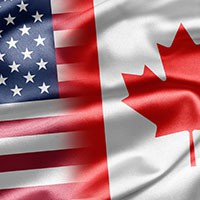IRS Shutdown: Tips for Canadian Taxpayers

The Internal Revenue Service (IRS) is operating again after a lengthy shutdown of the U.S. federal government that began in December 2018. A tentative deal was negotiated* late on Tuesday to avert yet another one. Still, Canadians with cross-border tax obligations should understand the specific implications of government shutdowns - like that of the IRS - and the backlogs they cause, and plan accordingly with their tax filing specialists.
-
Delayed tax refunds and processing times – U.S. citizens (including dual residents) and green-card holders who meet the income threshold requirements to file a 1040NR form with the IRS should anticipate delayed
 processing times. This includes likely delays in receiving refunds, if applicable. Canadians relying on U.S. tax refunds to meet CRA tax obligations should factor this into their planning.
processing times. This includes likely delays in receiving refunds, if applicable. Canadians relying on U.S. tax refunds to meet CRA tax obligations should factor this into their planning.
-
Inability to get IRS documentation required for Canadian tax filing – During an IRS shutdown, Canadians remain unable to request documentation required for tax filing with the CRA, including any pertaining to past foreign tax credits. The CRA has not announced any filing deadline extensions for those who might have been affected during the shutdown that ended in January.
-
Difficulty obtaining documentation to begin U.S. business operations – Canadian business owners looking to take their operations south of the border require an Employer Identification Number from the IRS in order to hire employees, begin payroll processes, and even open bank accounts. Obtaining an Employer Identification Number is not possible during a shutdown. This should be considered by business owners during the operational planning process when there’s a warning another shutdown may occur.
-
Money stuck in escrow, for Canadians selling real estate in the U.S. – Individuals who require a withholding certificate to release funds held in escrow for sales tax (typically, 10-15% that they’re eligible to get back in the case of net profit loss) under the Foreign Investment in Real Property Tax Act (FIRPTA), won’t be able to obtain one during an IRS shutdown. Money could, therefore, remain in escrow longer than anticipated.
Join Knowledge Bureau at the CE Summit workshops taking place in four Canadian cities this May and June. This is when cross-border tax expert Dr. Dean Smith will give a high-level overview and answer questions about the complex relationship between the IRS and the CRA that advisors must be able to address with their clients.
*CBC News report
Additional educational resources: For more insight on how to help clients with cross-border tax obligations, take the Cross Border Taxation certificate course. Cross-border tax efficiency and investment will also be on the agenda for DAC 2019 in Puerto Vallarta, where the theme will be “Powerful Competition: The Secret to Economic Resilience.”
COPYRIGHT OWNED BY KNOWLEDGE BUREAU INC., 2019.
UNAUTHORIZED REPRODUCTION, IN WHOLE OR IN PART, IS PROHIBITED.
 |
 |
 |
 |
|
Refer a Friend |
Research |
Calculators |
Course Trials |
 |
 |
 |
 |